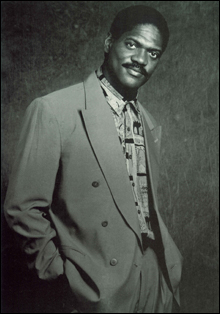Bringing the Bard to Boston Common
By IRIS FANGER | July 17, 2007

Johnny Lee Davenport |
The fairies are creeping on their bellies along the carpet of the Wang Theatre rehearsal-hall floor as director Steven Maler and choreographer Anna Myer watch. Under their instruction, the band of sprites break from a circle into more compelling patterns. Antonio Edwards-Suarez’s Puck howls like a wolf to rally his minions behind him. One week before Commonwealth Shakespeare Company’s A Midsummer Night’s Dream brings the Bard’s fairyland to a stage near the Parkman Bandstand for the annual offering of free Shakespeare on Boston Common, the final scene is beginning to jell.Founded by Maler 11 years ago and eventually taken under the wing of the Wang Performing Arts Center (now the Citi Performing Arts Center), Commonwealth Shakespeare Company presented the Bard’s Dream as its first production, on Copley Square, to an unplanned soundscore of cars whizzing by and airplanes overhead. “I’ve never directed the same play twice,” says Maler. “It’s like I’ve been in this room before.”
| A Midsummer Night’s Dream | Commonwealth Shakespeare Company | Parkman Bandstand, Boston Common | July 24-29; July 21, 22 open rehearsals | Free | 617.532.1212 orwww.freeshakespeare.org |
The director’s idea is that the play’s two worlds — that of the Athenian court and the surrounding woods — “collide, intersect, cross-pollinate.” So he’s cast New York–based actress Mimi Bilinski as both Amazon queen Hippolyta and fairy queen Titania and distinguished Shakespeare & Company vet Johnny Lee Davenport as the Athenian duke and the fairy king. Davenport is a veteran of 28 previous Shakespeare productions; he most recently appeared in Actors’ Shakespeare Project’s Love’s Labour’s Lost, and he’s played Oberon three times already. Yet it’s not the same, he says. “Everything changes. There’s so much about the immediacy of the production that it’s all about the new relationships. Oberon is hearing, seeing, feeling: the senses. Theseus is the opposite: about intellect. This is the first time Dream is how I imagine it — putting it into the forest of balloons.”The major changes for Shakespeare on the Common this year are its move from the Parade Ground back to Parkman Bandstand, because of a reconstruction project, and a sharp reduction in the number of performances. Josiah Spaulding, president and CEO of Citi Performing Arts Center, says, “It’s part of our new strategic vision to make sure the core programs of the Wang Center are fully funded each year to make the programs sustainable.”
Translation: the sponsors have taken a hit of $1.2 million over the past few years, and some belt tightening is necessary. Last season’s elaborate North End setting for Twelfth Night ran costs to more than $900,000. This year, that balloon forest, which is designed by Beowulf Boritt and will be complemented by the shrubbery on the Common, will help keep the budget down to $500,000. Says Maler, “Rather than stage architecture, we decided to focus on the architecture of bodies in space.”
 Related
Related:
Balloon moon, Let’s get physical, Twin peaks, More 
- Balloon moon
Sometimes less is more when imagination rules.
- Let’s get physical
Shakespeare’s super-dainty Kates become cannoli in The Taming of the Shrew on Boston Common.
- Twin peaks
The bay of Ephesus laps Collins Avenue in Commonwealth Shakespeare Company's Latin-tinged, frisky if over-frenetic The Comedy of Errors (at the Parkman Bandstand on Boston Common through August 16). It is not across sands of subtlety but through a spray of salsa that the perpetrators of this 1930s-South-Beach-set riff on Shakespeare's early comedy pratfall.
- That’s amore
The Light in the Piazza is an ambitious if old-fashioned musical.
- Mirrors up to Nature
Up close, the Forest of Arden, an elevated glade tucked into Boston Common, looks like verdant, dappled clouds tacked to two-by-fours.
- Mucho Ado
Much Ado About Nothing is hardly about inconsequential things. It’s about life, love, and the apparent loss of each through malevolent treachery.
- Play by play: August 21, 2009
Boston's weekly theater schedule
- Mixed and mismatched
Oh those Elizabethans, those cutups, those bawdy scamps. If we had only William Shakespeare's The Comedy of Errors to go by, we'd wonder how the Brits ever built an empire between all the misidentifications and panicked confusions.
- Play by play: August 14, 2009
Boston's weekly theater schedule
- Play by play: July 17, 2009
Boston's theater schedule
- Play by play: July 24, 2009
Boston's weekly theater schedule
- Quake and Shake
A tenderhearted yarn spinner tells an anxious little girl a story about a talking bear hawking honey. A nerdy young debt collector comes home to find a six-foot amphibian bent on recruiting him to save Tokyo from a natural disaster. Both scenarios emanate from the brain of award-winning Japanese writer Haruki Murakami.
- Less

 Topics
Topics:
Theater
, Entertainment, Performing Arts, William Shakespeare, More  , Entertainment, Performing Arts, William Shakespeare, Theater, Theatrical Plays, Josiah Spaulding, Johnny Lee Davenport, Anna Myer, Antonio Edwards-Suarez, Mimi Bilinski, Less
, Entertainment, Performing Arts, William Shakespeare, Theater, Theatrical Plays, Josiah Spaulding, Johnny Lee Davenport, Anna Myer, Antonio Edwards-Suarez, Mimi Bilinski, Less 